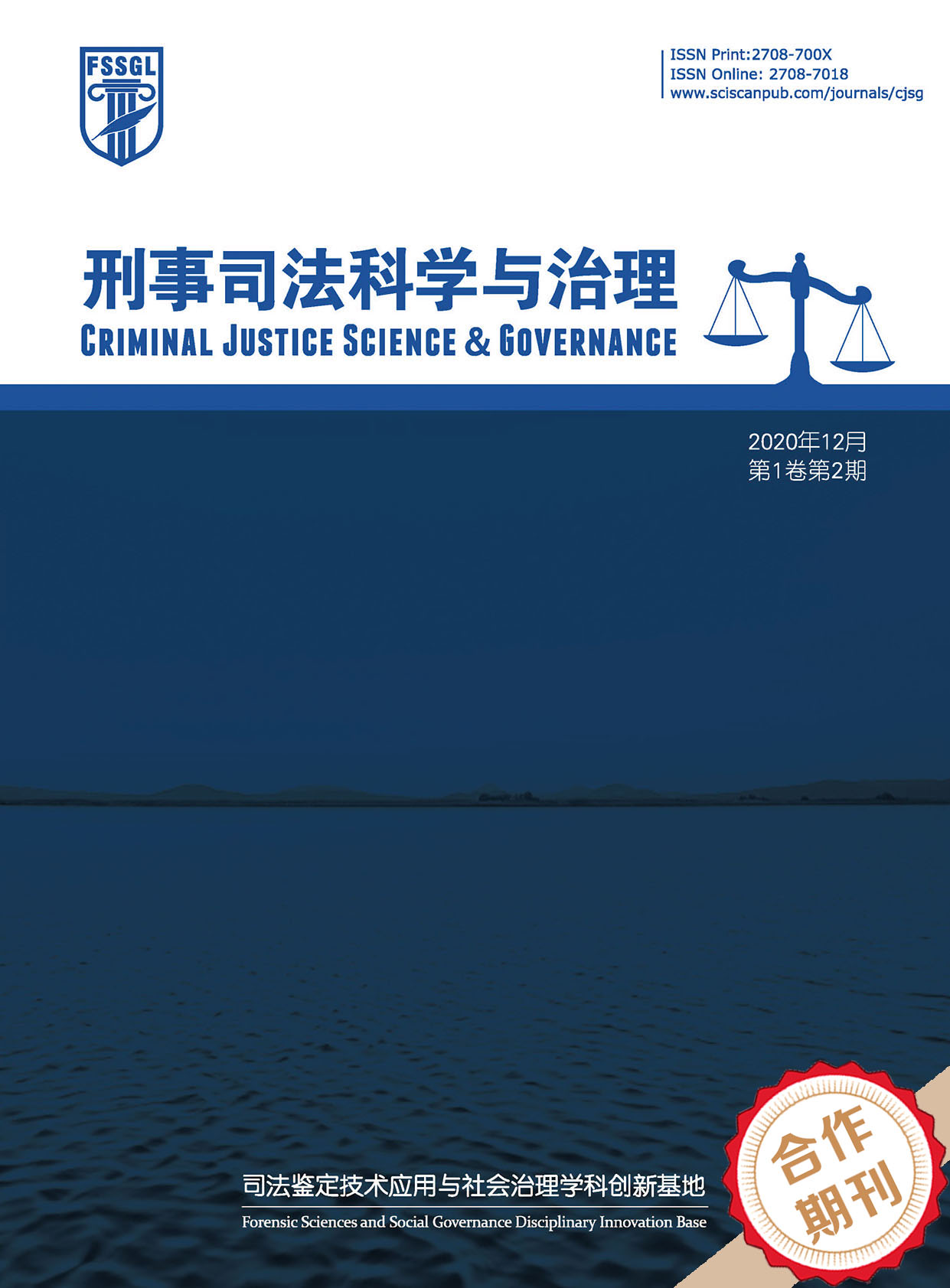Criminal Justice Science & Governance
区块链技术在司法存证中的价值优势、实践样态与应用进路
Blockchain Technology’s Value Advantages, Practical Manifestations, and Application Trajectory in Judicial Notarization
- Authors: 汪予佳
-
Information:
西南政法大学刑事侦查学院,重庆
-
Keywords:
Blockchain; Judicial record-keeping; Electronic data; Decentralization; Evidence rules区块链; 司法存证; 电子数据; 去中心化; 证据规则
- Abstract: Blockchain technology, with its characteristics of decentralization, immutability, and transparency, has introduced an unprecedented trust mechanism to judicial record-keeping. Amid challenges faced by traditional methods, such as vulnerability to tampering and difficulties in tracing, blockchain ensures the authenticity and integrity of evidence through distributed ledgers, significantly enhancing the credibility of legal evidence and judicial efficiency. As blockchain applications in judicial record-keeping advance, issues including ambiguous review standards, lack of industry regulations, concerns over technology maturity and security, as well as inadequate public awareness, have emerged as areas that cannot be overlooked. Looking forward, blockchainbased judicial record-keeping will progress from isolated implementations towards integration across the entire judicial system chain. Efforts should be directed towards establishing review procedures and recognition standards tailored for blockchain records, fostering a unified deposition platform and standards, intensifying talent cultivation and education, refining evidence examination processes, and advocating for the development of new evidence rules that accommodate the unique attributes of blockchain, thereby promoting justice and efficiency in the judiciary. 区块链技术,凭借其去中心化、不可篡改和透明性等特性,为司法存证带来了前所未有的信任机制。在传统存证方式面临易篡改、追溯难等问题的背景下,区块链技术通过分布式账本确保证据的原始性与完整性,极大增强了法律证据的可信度与司法效率。然而,随着区块链技术在司法存证领域的深入应用,审查标准模糊、行业规范缺失、技术成熟度与安全顾虑,以及公众认知度不足等成为不可忽视的问题。未来,区块链司法存证将从局部应用向司法体系全链条发展,应当致力于构建一套适用于区块链存证的审查流程与认定标准,建立统一的存证平台与标准,加大人才培养和教育力度,细化证据检验流程,并倡导构建适应区块链特性的新型证据规则,以促进司法公正与效率。
- DOI: https://doi.org/10.35534/cjsg.0502006
- Cite: 汪予佳.区块链技术在司法存证中的价值优势、实践样态与应用进路[J].刑事司法科学与治理,2024,5(2):43-56.
随着数字化浪潮席卷全球,司法领域正面临一场深刻的技术革命。在大数据、云计算、人工智能等前沿科技的驱动下,司法存证作为司法活动的基础环节,其效率、公正性与透明度成为衡量司法现代化水平的重要指标。然而,传统司法存证方式在应对海量信息、保障数据安全、提升存证效率等方面暴露出明显的局限性,难以满足社会公众对高效、公正、透明司法服务的期待。在此背景下,区块链技术以其独特的去中心化、透明性、不可篡改性等特性,为破解司法存证难题提供了崭新思路。
区块链技术作为一种分布式账本技术,通过共识机制、加密算法和智能合约等核心技术,实现了数据的透明共享、全程留痕与无法篡改,与司法存证追求的真实性、完整性、可追溯性需求高度契合。近年来,全球范围内已有多国积极探索区块链技术在司法存证中的应用,如知识产权确权、电子合同存证、证据链管理等领域,初步显现了提升司法效率、保障司法公正、降低司法成本的效果。在我国,最高人民法院发布的《关于人民法院进一步为“一带一路”建设提供司法服务和保障的意见》等政策文件,明确鼓励探索区块链等新技术在证据保全、涉外送达、执行协助等方面的应用,为区块链技术在司法存证领域的应用提供了政策指引和实践土壤。
然而,尽管区块链技术在司法存证中的应用前景广阔,但在实践中仍面临一系列问题。技术层面,区块链技术的成熟度、兼容性、安全性等仍有待提升;法律层面,现行法律法规对区块链存证的适用性尚不明确,相关司法解释和行业标准亟待建立;社会层面,公众对区块链技术的认知度和接受度参差不齐,用户教育与生态建设任重道远。因此,深入研究区块链技术在司法存证中的应用现状,剖析存在问题,提出针对性的优化路径,对于推动我国司法存证体系的革新,提升司法公正与效率,具有重要的理论价值与实践意义。本论文旨在全面梳理区块链技术在司法存证中的应用现状,揭示其在提升司法效率、保障司法公正、降低司法成本等方面的积极作用,以及实践中存在的技术、法律、社会问题。基于此,论文将进一步探讨区块链技术在司法存证中的优化路径,包括技术升级与融合、法律制度创新、生态建设与合作机制等多维度的解决方案,为我国司法系统有效利用区块链技术,实现司法存证的现代化转型提供理论支撑与实践指导。
一、区块链技术概述与司法存证需求契合性分析
(一)区块链技术原理与特性
区块链技术是一种分布式账本技术,以其去中心化、数据不可篡改和透明度的特点而闻名。这项技术作为一种去中心化的数字货币系统首先被应用于比特币。其核心是一个由网络中的多个节点共同维护的公共数据库,这些节点在没有中央管理者的情况下通过一种称为共识机制的过程来验证和记录所有交易。核心原理包括去中心化、共识机制、时间戳和加密算法等要素。
去中心化是指区块链技术打破了传统中心化系统的架构,采用分布式网络,每个参与者(节点)都拥有完整的数据副本,这意味着不存在单一的中心控制点,数据的存储和验证由网络中的多个节点共同完成。这种去中心化设计增强了系统的鲁棒性和抗攻击能力,减少了单点故障风险。共识机制则是区块链网络中节点就交易有效性达成一致意见的规则,常见的共识机制包括工作量证明(Proof of Work,PoW)、权益证明(Proof of Stake,PoS)、委托权益证明(Delegated Proof of Stake,DPoS)等。共识过程确保了区块链上的交易记录在全网范围内的一致性,防止双花攻击(double spend attack)等欺诈行为。时间戳原理意味着每个区块在被添加到区块链时,都会被打上精确的时间戳,由此确保了区块链上所有交易的先后顺序,形成了不可逆的时间线,这一特性对于确保交易的顺序性和防止历史记录被篡改至关重要。区块链技术用来保障数据的安全性和隐私性的加密算法主要包括哈希函数、数字签名等。哈希函数用于将任意长度的数据映射为固定长度的唯一哈希值,在区块链中,哈希函数用于生成交易的哈希、区块的哈希以及链接区块之间的哈希指针。哈希值的唯一性和抗碰撞性使得对区块链数据的任何篡改都将导致哈希值的变化,从而易于检测。数字签名则是基于非对称加密技术,交易发起者使用私钥对交易数据进行签名,网络中的其他节点通过其公钥验证签名的有效性,确保交易的来源可信且未经篡改。
区块链技术通过这些核心原理实现了其公开透明、不可篡改、分布式账本和可编程性等特征,为虚拟货币及其他诸多领域提供了全新的信任基础和价值转移方式。首先,区块链上的交易数据对全网公开,任何参与者都可以查看到交易的时间、金额、参与者地址等信息。虽然交易发起者的实际身份通常保持匿名,但交易历史本身是完全透明的,增强了市场的透明度和公众监督。其次,一旦数据被写入区块链并得到充分确认(达到一定数量的确认数),其信息就几乎无法被修改或删除。这是因为任何对已确认区块数据的改动都会导致后续所有区块的哈希值发生变化,需要重新获得网络中大部分节点的共识才能被接受,而这在实际操作中几乎不可能实现,因此,区块链确保了数据的完整性和不可篡改性。再则,区块链实质上是一个由众多参与者共同维护的分布式账本。每个节点都保存有一份完整的交易历史记录,通过共识机制确保账本内容的一致性,这种分布式账本设计消除了对中心化信任机构的需求,实现了点对点的价值转移。最后,部分区块链(如以太坊)支持智能合约,这是一种自动执行特定条件的程序,智能合约以代码形式部署在区块链上,当满足预设条件时,合约自动执行相应的操作,如转移资产、触发事件等。这种可编程性极大地扩展了区块链的应用范围,使之能够支撑复杂业务逻辑和去中心化应用的运行,如通过智能合约则把合同的条款编制成一套计算机代码,在交易各方签署后自动运行,合同各方所有的协商、签署、履行、纠纷等过程都将一字不漏且无法篡改地被记录在司法区块链。一旦当事人违约,将由调解机构介入进行纠纷多元化解程序,相关数据将进入司法区块链存证,若调解不成则在诉讼阶段推送至互联网法院诉讼平台。
(二)司法存证需求与痛点
司法存证是司法活动中不可或缺的一环,其目的是确保证据的真实、完整、合法,为案件的审理提供可靠依据。在数字化时代,司法存证需求呈现出诸多特点,并面临着挑战。
1. 真实性与完整性:电子数据易遭篡改与破坏
随着信息技术的深入渗透与广泛应用,电子数据已无可争议地成为现代社会信息交流与记录的核心载体。相较于传统的纸质媒介,电子数据因其固有的数字化属性,呈现出显著的易复制性、易删除性与易修改性的特点,其真实性与完整性更容易受到威胁。例如,黑客攻击、恶意软件、内部人员操作失误等都可能导致电子数据的损毁或篡改。并且,由于计算机技术的愈发精进,篡改电子数据的方式也变得日益复杂且难以察觉。近年来,深度学习驱动的深度伪造技术快速发展,能够生成极其逼真的音频、视频内容,甚至能够模拟特定个体的言谈举止,达到以假乱真的效果。这类伪造信息一旦混入电子数据流中,无疑为司法机关甄别真实信息增添了巨大的难度,极易误导调查方向,影响案件侦查。此外,尽管各国法律体系正在逐步加强对电子证据的规范,如制定电子签名法、电子证据法等相关法规,试图为电子数据的法律地位、采集、保管、出示及采信规则提供明确依据,但在实际司法实践中,仍存在诸多法律空白或规定不明之处,进一步加剧了电子证据真实性审查的复杂性。在全球化背景下,电子证据往往跨越国界,涉及不同法域的证据规则与司法协助机制。然而,国际间对于跨国电子证据的取证方式、证据转换、证据互认等方面的规则尚不完善,使得司法机关在处理此类证据时面临法律依据不足、操作程序混乱等困境。
2. 可追溯性与防伪性:证据链构建困难
在现代复杂多变的法律环境中,特别是在金融犯罪、网络犯罪等案件中,构建一条完整、连贯且具有说服力的证据链成为司法实践中不可或缺的关键环节。这类案件往往涉及大量的电子数据类证据,如电子邮件、即时通讯记录、交易数据、网络日志、社交媒体帖子等,它们具有高度的技术性、动态性、分散性以及跨平台、跨地域的特点,给证据的收集、固定、鉴别与关联带来了前所未有的挑战。
一方面,电子数据的生成、更新与销毁速度极快,且易于修改,其生命周期内状态的变化难以精确追踪。并且,数据往往存储在不同的服务器、云端平台、个人设备甚至区块链网络中,这种分散性使得证据的搜集工作如同“大海捞针”,不仅耗时耗力,而且容易遗漏关键信息。另一方面,互联网的无边界性使得证据可能跨越不同国家和地区的管辖范围,涉及不同法律体系下的数据保护法规、取证规则与司法协助机制。跨国取证的复杂性、高昂成本以及法律冲突,无疑加大了证据链构建的难度。具体到知识产权侵权、网络诽谤等案件中,涉案当事人可能迅速删除、加密、伪装甚至销毁相关电子证据,以逃避法律责任。即使采用传统的保全手段如公证、屏幕截图等,也往往因滞后性、完整性受限以及在新技术面前的脆弱性,难以有效对抗证据的瞬间消失或恶意操纵。对于新型电子证据,尤其是涉及数据抓取、远程访问、网络追踪等技术手段获取的证据,其合法性、可靠性和关联性在法律实践中常引发争议。司法机关需要在尊重隐私权、保障数据安全与追求司法公正之间寻求平衡,而现有的法律规定与判例有时难以提供明确的指导。
3. 效率与成本:传统存证方式应对乏力
面对电子数据海量化的趋势,传统的存证方式依赖人工进行数据采集、存储、鉴定等操作,面临着前所未有的资源消耗。具体而言,在人力成本方面,随着数据量的指数级增长,尤其是涉及大数据分析、云计算、人工智能等前沿领域的案件,人工处理数据的工作量成倍增加。从数据的初步筛选、提取、整理到最终的分析与鉴定,都需要大量的专业人员投入,人力资源的消耗与需求矛盾日益突出。而对于物力成本的消耗,传统存证方式通常要求配备专用的硬件设施,如大型存储设备、专用服务器等,用于容纳海量数据。这些设施不仅购置成本高昂,而且维护、升级与扩容所需的资金亦不容忽视。并且,在处理海量电子数据时,传统方式的低效率尤为显著。数据的检索、提取、验证等工作往往耗时漫长,且容易受人为因素影响,出现错误或遗漏。司法活动在追求公正的同时也必须兼顾效率,这种时间滞后无疑会拖延案件审理进程,影响司法效率。
此外,在大数据时代,相关案件的数据关联性分析、模式识别、预测模型构建等复杂任务,传统存证方式难以胜任。人工处理无法快速捕捉数据间的深层次关联,也无法高效应对数据更新速度极快的动态环境,将导致对数据价值的挖掘深度与广度受限。特别是近年来,随着生成式人工智能的兴起,使得数据形态更加复杂多样,如机器学习模型输出、AI创作的作品等。而传统存证方式往往无法有效追踪、验证这些新型数据的生成过程与原始来源,这就容易导致证据链完整性受到威胁。
(三)区块链技术与司法存证需求的契合性
司法存证在真实性与完整性、可追溯性与防伪性、效率与成本等方面面临着严峻挑战,亟待引入更为高效、安全、适应数字化时代的新型存证手段。区块链技术凭借其独特的去中心化、透明性、不可篡改性、可追溯性等特性,为解决传统司法存证面临的诸多痛点提供了创新性解决方案。
1. 真实性保障:强化电子证据的可信度
区块链技术的核心在于其数据结构设计,即通过时间戳和哈希链接确保数据的不可篡改性。每一笔交易或数据记录在被添加至区块链时,都会被打上精确到秒的时间戳,以此记录其生成的确切时刻。同时,每个新产生的区块包含前一区块的哈希值,形成一条由哈希值串联起来的链式结构。这种设计使得任何对已记录数据的改动,都将导致后续区块的哈希值发生连锁反应,进而被网络中的其他节点迅速识别为无效。由于篡改历史数据需要控制超过51%的网络算力,而在主流公有链中这一条件几乎不可能实现,因此,区块链上的数据一旦写入,理论上即具有近乎绝对的不可篡改性。另外,区块链通过共识算法(如工作量证明、权益证明、委托权益证明等)可以确保网络中的节点就数据的有效性达成一致意见。新数据块的添加必须经过多数节点的验证和确认,确保其符合预设的规则和协议。这种集体验证机制使得数据的真实性不再依赖于单一权威机构的背书,而是由整个去中心化网络共同保障。即使有恶意节点试图提交虚假或篡改后的证据,也会因无法获得足够数量节点的共识而被网络拒绝。
在司法存证场景中,证据数据一旦经过合规的上链流程,即转化为具有法律效力的链上记录。由于区块链的不可篡改性,这些记录在法律意义上被视为原始证据,而非传统的复制件或转述。证据上链的过程通常包括数据加密、哈希计算、签名确认等步骤,确保证据的完整性和来源可靠性。任何针对链上证据的修改企图,不仅会在技术层面上触发链上其他节点的自动检测,而且会因其违反区块链共识规则而失去法律认可,从而有效防止证据的恶意篡改。区块链技术背书下的证据稳定性,极大地提升了电子证据在法庭上的可信度。相比于传统电子证据易受技术手段干扰、易于丢失或被篡改的特性,区块链上的电子证据具备高度的抗干扰性和持久性。这种技术特性有助于消除法官、诉讼主体乃至公众对电子证据真实性的合理怀疑,降低因证据真实性争议导致的审判延误,提高司法效率。
区块链的分布式账本特性可以确保所有链上数据对网络参与者公开透明,因为每个参与节点均拥有完整的账本副本,可以独立查询并验证任何一笔数据记录。在司法实践中,法官、当事人、律师乃至公众,都可以借助区块链浏览器等工具,追溯并核实证据的生成、流转过程,无需依赖单一权威机构的授权或披露。这种透明度不仅增强了证据审查的便利性,也有助于消除信息不对称,减少暗箱操作的可能性,提升司法公正的透明性。这一技术将使得电子证据的生成、保管、传递等全过程均在去中心化网络的监督之下,证据的公信力在技术的帮助下得到增强。此外,由于每一环节的操作都留有明确的数字足迹,无法被事后抹除或篡改,这种技术层面的透明度和可追溯性,不仅有助于提升司法系统的内部监管效能,同时可以实现社会公众对司法活动的外部监督,从而在更大范围内促进司法公正的实现。
2. 证据链构建:确保证据关联性与连续性
区块链技术通过哈希指针(也称梅克尔树结构)实现了数据的有序串联与不可割裂,即每笔交易或证据数据在被写入区块时,除了包含自身的哈希值外,还会包含前一区块的哈希值,从而形成一个由哈希值构成的链式结构。这种设计确保了每一项证据与其前序证据之间存在明确且不可篡改的关联关系,即“证据链”。哈希指针的使用不仅能够确保数据的完整性,还能确保数据的顺序性,使得证据间的因果关系、时间顺序等内在联系得以精准体现,符合司法审判对证据关联性的严格要求。区块链采用P2P网络架构,各节点通过共识机制实时同步数据,确保所有节点持有的全局账本视图保持一致。即使部分节点的数据因意外原因丢失或损坏,其他节点仍持有完整的证据链副本,可以通过网络传输迅速恢复受影响节点的数据完整性。这种容错机制极大地增强了证据链在面对系统故障、数据局部损失等情况时的韧性,保障了证据链在司法审判过程中的持续可用性。
在司法案件中,尤其是涉及多个主体、多种类型证据的复杂案件,区块链技术能够帮助法官、律师和调查人员清晰、有序地构建和呈现证据链。证据链能够按照事件的时间顺序、逻辑关系进行排列,直观展示证据间的因果联系和事实脉络,便于法官准确把握案情进展和关键节点,提高审判效率。例如,在金融犯罪、知识产权侵权、供应链纠纷等案件中,区块链技术能够将分散在不同平台、不同时间点的交易记录、知识产权登记、货物流转信息等证据无缝整合,形成一条完整的证据链条,为定罪量刑提供有力支持。对于长期、复杂的案件,特别是那些跨越较长时间段、涉及多平台数据交互的案件,传统证据保存和管理方式往往面临证据链断裂的风险。区块链技术的运用,能够克服时间推移带来的数据遗失、系统更新导致的格式不兼容等问题,确保证据链在司法程序中的连续性。例如,区块链技术能够确保电子合同、电子邮件、社交媒体记录等电子证据在经历多次系统升级、服务器迁移后,依然能够以其原始状态被检索、验证,避免因技术变迁导致证据失效或难以采信。
3. 效率提升:简化存证流程与加速司法进程
区块链技术为司法存证提供了统一且易于使用的接口,有望打破传统存证过程中对公证人、鉴定机构等第三方依赖的束缚。电子数据,包括但不限于文档、图片、视频、交易记录等,可以直接通过区块链平台提供的API接口或其他合规应用程序上传至区块链网络,这一过程省去了线下公证、鉴证的繁琐手续,以及由此产生的等待时间与费用,实现了证据的即时生成与固化。当事人或相关机构只需遵循相应的操作指引,即可在几分钟内完成证据的安全存储,显著缩短了证据从生成到存证的时间间隔,有利于证据的及时保全,防止因延误导致的证据灭失或被篡改。区块链智能合约则能够进一步推动存证流程的自动化,在司法存证场景中,智能合约可被编程以自动抓取特定网站内容、监控知识产权侵权行为、追踪供应链动态等。当预定事件发生时,智能合约能够自动启动证据采集、加密、哈希计算、时间戳生成及上链存证等一系列流程,无需人工介入。这种自动化机制大幅减少了人为操作的复杂性和错误风险,提高了存证工作的准确性和效率。
不同司法辖区、不同区块链平台之间的证据共享与互认是司法协作中的重要环节。随着跨链通信协议等技术的发展,证据能够在不同的区块链生态系统间实现安全、高效地流通。在理想设计中,通过标准化的数据格式、身份认证机制以及跨链验证协议,证据能够被不同司法系统认可,无须重复存证或繁琐的法律文书交换。这不仅可以简化跨境司法协助中的证据交换程序,减少司法资源浪费,而且能够极大地提升司法协作的响应速度,有助于跨国案件的快速侦破与审理。
4. 成本优化:降低存证成本与司法资源消耗
区块链司法存证通过一系列技术特性与机制设计,可以降低司法过程中的成本负担。
首先,区块链技术的即时存证与自动验证特性能够加速证据的收集、存储与验证流程。传统存证过程中,这些步骤可能涉及繁复的物理文件管理、公证过程以及多次人工审核,成本高昂且耗时。区块链存证通过智能合约和自动化的数据处理,几乎实时地完成证据的登记与验证,大幅度减少人工介入,降低了人力资源成本。其次,区块链的不可篡改性和时间戳功能确保了电子证据的原始性和完整性,能够有效减少因证据真实性引发的争议。这种技术特性使得证据一旦上链,其真实状态即被永久锁定,大幅降低了后续的证据争议和重复验证成本,避免了因争议而产生的额外诉讼费用。最后,区块链司法存证平台能够整合多源数据,实现证据的快速检索和交叉验证,从而达到优化司法资源配置的目的。法官和律师可以即时访问到经过区块链验证的证据,减少法庭准备时间,加速案件审理进程,从而节约了司法系统的时间和资源成本。区块链的分布式账本技术促进了不同司法机构、政府机关及第三方机构之间的信息共享,提高了协同作业的效率,减少了以往因信息不对称导致的协调成本和时间损耗。以司法联盟链legalXchain为例,目前其联盟节点已覆盖IP360、公证机构、司法鉴定机构、法院等多个权威司法节点,是目前区块链落地应用中联盟节点最多的区块链系统,现已大规模应用于法律行业,为司法机关、法律科技公司、互联网公司、律师群体等客户群体提供了大量服务。通过区块链网络,不同法院间可以快速共享已被验证的证据,无需再次进行证据交换和验证,从而能够进一步简化跨区域或跨境诉讼程序。另外,区块链技术在合同管理、知识产权保护等领域已经展现出优越的应用潜力,该技术能够帮助企业与个人在事前预防法律风险,减少因合同纠纷、侵权行为等引发的诉讼,从源头上控制了长期的法律成本开支。
二、区块链技术在司法存证中的实践样态
(一)区块链司法存证的进展
1. 政策指引
我国政府高度重视区块链技术在司法领域的应用。2017年,司法部印发《关于进一步做好司法行政信息化工作的意见》,明确提出要运用云计算、大数据、人工智能、区块链等新技术,推动司法行政信息化建设。该意见为司法行政部门引入区块链技术指明了方向,为后续区块链在司法存证中的应用提供了政策支持。2018年9月,最高人民法院印发《关于互联网法院审理案件若干问题的规定》,首次承认了经区块链存证的电子数据可以用于互联网案件举证。工业和信息化部于2019年1月10日发布《区块链信息服务管理规定》,该规定是中国首个针对区块链信息服务的专项法规,明确了区块链信息服务提供者、使用者的权利义务,以及监管机构的职责。尽管该规定并非专门针对司法存证,但它为区块链行业的整体合规性设定了框架,间接为司法存证应用的规范化发展提供了基础。同年10月24日,中共中央政治局组织了关于区块链技术发展现状和趋势的集体学习。习近平总书记在主持学习时强调,要将区块链作为核心技术自主创新的重要突破口,明确主攻方向,加大投入力度,着力攻克一批关键核心技术,加快推动区块链技术和产业创新发展。自此,区块链技术首次在政府层面上获得了明确的认可,司法领域中的区块链应用由此进入了高速发展期。随后,最高人民法院在《关于人民法院进一步为“一带一路”建设提供司法服务和保障的意见》中提出要依法支持信息技术发展,关注第四次工业革命发展趋势,及时完善电子商务、区块链、人工智能、5G信息网络建设等领域的司法政策,鼓励运用信息化技术和在线纠纷解决机制,优化送达方式,改革纠纷调处程序,化解涉外案件送达难、耗时长、公证认证慢等实际困难,高效低成本地解决国际商事纠纷。2021年5月27日,中央网络安全和信息化委员会办公室印发《关于加快推动区块链技术应用和产业发展的指导意见》,其中提出要利用区块链建立数字化可信证明,在司法存证、不动产登记、行政执法等领域建立新型存证取证机制。该指导意见的出台,体现了政府对区块链技术在司法存证领域应用的高度重视和积极推动。区块链技术的引入,旨在构建一种更为高效、透明、可信的存证体系,通过数据不可篡改、可追溯的特性,有效解决传统存证手段中可能存在的篡改、丢失、伪造等问题,提升司法存证的公正性和公信力。指导意见还特别强调了区块链在版权保护领域的应用,提出要发挥区块链技术优势,完善数字版权的确权、授权和维权管理。这将有助于简化版权登记流程,降低权利人保护自身权益的成本,同时提高侵权行为的发现和打击效率,为数字版权保护提供了全新的解决方案。随后,最高人民法院发布《人民法院在线诉讼规则》,首次对区块链存证的效力范围进行了明确规定。规则指出,区块链存储的数据一旦上链,即推定其未经篡改,具有法律效力。同时,规则确立了区块链存储数据上链前后的真实性审核规则,为司法实践中如何对待和采纳区块链存证提供了明确的法律依据。这一系列规定,在一定程度上标志着我国区块链证据及其规则体系的初步形成,为区块链技术在司法领域的深度应用奠定了坚实基础。2022年,最高人民法院发布的《关于加强区块链司法应用的意见》进一步强调了区块链技术在提升电子证据认定效率和质量方面的价值。该意见要求充分运用区块链数据防篡改技术,推动完善区块链存证的标准和准则,以期在司法实践中更好地发挥区块链技术的优势,提升司法效率,保障司法公正。
这些政策文件和发展趋势显示,中国对区块链技术在司法领域的应用持续投入重视,旨在通过技术提升司法透明度、效率及安全性。未来,随着区块链技术的进一步发展和应用的深入,我们有理由期待区块链将在司法存证领域发挥更大的作用,助力我国构建更加公正、透明、高效的司法环境。
2. 实践情况
区块链技术在电子证据领域的应用始于2018年。这一时期,伴随着互联网法院的陆续设立及其对前沿科技的紧密跟进,以及联盟链技术的日趋成熟,一批先行的电子证据平台企业如IP360、易保全、保全网等率先将区块链技术融入电子证据管理。早在互联网法院诞生之前,区块链电子证据虽已存在于市场,但作为新兴技术尚未获得广泛接纳和高度重视。杭州互联网法院在其创设之初,首先构建了电子证据平台,并在随后的阶段中升级为区块链电子证据平台;而在其之后设立的北京互联网法院和广州互联网法院,则直接在创立阶段就部署了区块链电子证据平台,分别为“天平链”和“网通法链”,用以支撑日渐增多的在线诉讼活动。2018年,杭州互联网法院审理的首例区块链电子证据案件以及同年北京东城法院同类案件引起了法律界的热烈反响和深度探讨。这两起判例与以往涉及电子证据的案例相比,特别之处在于,法院对区块链电子证据的审查与认定过程进行了详尽的法学论证,这对日后司法实践中区块链电子证据的采纳标准与相关司法解释的制定产生了深远影响。在杭州互联网法院的判例中,引入司法鉴定机构对链外取证过程进行司法鉴定,此举既增强了证据的整体效力,但也一定程度上弱化了区块链技术作为独立证据源的重要性。相比之下,北京东城法院在处理两家上市公司的知识产权纠纷案时,对区块链电子证据的审查和认定采用了严格和系统的法学逻辑,这份裁判文书近乎成为了在相关电子证据司法解释和规则制定前的“教科书式模板”,尤其是对电子证据平台中立性和利益无关性的阐述,逐渐在后来的司法解释和规则中得到了体现。2019年,最高人民法院着手构建全国统一的司法区块链系统,众多社会机构和企业,包括一线互联网公司、公证机构、司法鉴定机构、行政执法部门等,纷纷运用区块链技术提供存取证服务,区块链存证领域呈现出百花齐放的局面。2020年,随着在线诉讼机制的普及推广以及互联网法院对区块链电子证据应用的持续推进,涉及区块链电子证据的判例数量大幅度攀升。以区块链电子证据平台“IP360”为例,截至2023年,其区块链电子证据判例数量已超过10,000件。同时,一线互联网公司和各行各业的领军企业因对新技术的高度敏感,在日常法务工作中广泛采用区块链电子证据服务。公证行业也顺应潮流,积极推进区块链技术革新。目前,据不完全统计,全国已有超过20家公证处建立了区块链电子证据平台,区块链电子证据平台逐渐渗透到各类社会主体的法律实务中,应用场景涵盖了知识产权保护、金融交易、行政执法等多个领域。
(二)面临的问题与挑战
1. 审查认定标准和行业规范的缺失
尽管区块链存证技术展现了前所未有的潜在优势,但现有的法律体系在全面接纳和有效规范这一新型存证方式上尚显不足。尤其是在电子证据的采集、保管、提取和验证环节,法律对此类基于区块链技术的电子证据的具体要求、操作规范及法律效力的确认并未达到与技术发展相匹配的程度。例如,《中华人民共和国电子签名法》及其相关司法解释虽已对电子证据作出了规定,但对于区块链存证特有的属性,如数据分布存储、共识机制、时间戳标记等带来的法律后果,仍需要进一步细化和完善相应的法律条文和司法解释,以便在司法实践中准确判定区块链电子证据的法律地位和效力。自2018年以来,我国司法系统对区块链电子证据的关注与规范日益增强。最高人民法院先后通过多项司法解释和决定,旨在为区块链电子证据的审查认定提供法律依据。2018年9月3日通过的《最高人民法院关于互联网法院审理案件若干问题的规定》首次将区块链技术纳入电子数据固定技术范围,明确了电子数据审查认定的原则,但在司法实践中,如何具体评判电子数据是否满足相关条款仍是审理难点,这与缺乏明确的标准密切相关。2020年5月1日施行的《最高人民法院关于修改〈关于民事诉讼证据的若干规定〉的决定》进一步扩展了电子证据的适用范围,并对电子证据的审查认定提出了更细致的要求,包括电子数据的生成、存储、提取主体的适当性,以及影响数据完整性和可靠性的其他因素,同时明确了第三方存证平台的法律地位。然而,在实际操作中,如何界定何种平台属于中立第三方平台,以及如何满足这些审查要素,依然缺少统一的评判标准,导致不同法院在实践中有不同的理解和应用。2021年1月发布的《关于人民法院在线办理案件若干问题的规定(征求意见稿)》则对区块链电子证据进行了迄今为止最为详尽和独立的论述,区分了取证和存证两个过程,并对区块链电子证据的真实性审查制定了更为具体的规定,间接提及了对区块链服务提供者资质的要求,如网信办区块链服务备案、信息安全等级保护三级资质以及电子数据存证技术规范等,这有助于清理整顿市场秩序,加强对区块链存证主体的规范约束。然而,相对于存证环节,征求意见稿中对区块链取证过程的客观不可干预性进行了首次明确,指出取证的公正性取决于取证平台主体的中立性以及取证技术机制的严谨性。虽然对取证过程的抗辩点有所预见,但在相关文件中,区块链取证技术规范和标准的阐述尚不够充分、清晰和有力,需要在未来的司法实践中不断探索和完善。
现存的另一大挑战在于行业规范的缺失,尤其是针对版权存证及基础区块链技术的标准制定不足。各类存证主体依据各异的指导原则作业,如公证机构遵循的《办理保全互联网电子证据公证的指导意见》,其操作示例局限于特定操作系统与浏览器版本,难以适应信息技术的快速迭代。司法鉴定机构虽有《电子数据法庭科学鉴定通用方法》等国家标准指导,但这些规范出台于区块链技术广泛应用之前,缺乏针对性的操作指南。商业区块链存证平台则依据各自的软件应用和专利技术运营,缺乏统一标准,增加了行业整体的规范性和安全性难度。
此外,全球法律环境的复杂性也为区块链存证的跨境应用带来了一系列棘手的问题。不同的国家和地区对电子证据的法律认可程度各异,其对区块链技术的理解和接纳也有明显区别。跨境司法案件中,区块链存证可能遭遇各国法律体系之间的冲突,例如,关于数据主权、隐私保护、证据获取和承认等方面的法律差异,可能导致区块链存证的跨国应用受到阻碍。为了在全球范围内推动区块链存证的广泛应用,迫切需要国际间展开深入对话与合作,共同制定统一的法律标准和国际协议,从而确保区块链存证能够在跨越国界的司法环境中顺利落地生根。
2. 技术接受度与公众认知
区块链技术在司法存证领域的接纳度与公众认知是一个发展中的关键环节,同时也是当前面临的主要挑战。尽管法律法规逐步加强对区块链电子证据的认可与规制,如《关于民事诉讼证据若干问题的规定》的更新推动了电子证据新时代的到来,但在实际司法运用层面,区块链电子证据的普及率与利用率仍有待提高。尽管涉及电子证据的案件数量快速增长,区块链技术的优势——确保电子证据的完整性和不可篡改性并未在所有案件中得到充分利用,其普及程度在司法实践中仍低于预期水平。从专业视角看,司法体系内部对于区块链技术的认识和操作能力存在显著差异,部分法官、律师和其他从业者未能全面把握区块链技术的潜在变革力量,或是在实际运用中遭遇技术和评估难题,从而制约了区块链电子证据在司法实践中的广泛应用。与此同时,公众对区块链技术的认知与信任度也是亟待提升的关键点。由于区块链本身的复杂性,普通民众往往难以深入理解其运作机制、安全防护措施及其在司法环境中的具体应用价值。为此,提升公众信任度不仅需要通过持续的科普教育和培训活动来增进理解,还依赖于成功案例的传播以展现区块链存证的实效性和合法性。
尽管当前区块链电子证据的应用还未全面超越传统电子证据,但社会对区块链技术的广泛认识和积极展望预示着其未来发展趋势。实际上,近年来裁判文书网数据显示,涉及区块链电子证据平台的案件裁判数量正迅速逼近并有望超过传统电子证据。随着司法实践的推进及认知转变的深化,预计在不远的将来,尤其是在取证和判决过程中,区块链电子证据将成为主导的证据形式,实现其在司法领域内的广泛应用和普及。
3. 技术成熟度与安全性问题
尽管区块链技术的核心组件,包括加密算法、分布式账本和共识机制,已经过理论验证和初步实践检验,但这并不意味着区块链应用在实际部署中能天然免疫所有安全威胁。技术的成熟与可靠仅构成安全的基础,而真正决定应用层安全性的,更多取决于开发者如何将这些技术组件整合并应用于特定场景中。正如建筑学中的坚固材料并不直接等同于稳固的建筑,没有精确的设计和施工,再优质的材料也可能因人为失误而失去效用。在区块链应用的广阔舞台上,从智能合约的编写到网络架构的搭建,每一个环节都需要高度的专业技能与严谨的态度。遗憾的是,现实情况往往是参差不齐的。诸如The DAO资金被盗、Bitfinex遭遇大规模资产损失、Parity钱包漏洞事件,以及Youbit因黑客攻击导致的破产,这一系列惨痛教训无不指向一个事实:即便是微小的编程错误或安全漏洞,也可能被恶意利用,造成难以估量的经济损失。据相关统计,至2023年第二季度,全球范围内公开报道的区块链安全事件已超过千例,经济损失累积达296亿美元以上,这无疑敲响了安全警钟。
并且,对于版权存证这一特定应用领域而言,虽然不像加密货币那样直接承载着巨大的经济价值,但其在司法体系中的作用同样举足轻重。电子数据证据的完整性与真实性,是法庭判断案件事实的重要依据。一旦区块链存证系统因安全漏洞遭受攻击,导致证据被篡改或删除,不仅会直接损害案件当事人的权益,还可能动摇司法判决的公正性和权威性。因此,确保区块链存证的安全性,不仅是技术上的追求,更是维护法律尊严和公平正义的必要条件。与此同时,科技进步如双刃剑,既为区块链技术带来革新机遇,也带来了前所未有的挑战。量子计算便是其中最引人瞩目的例子。随着量子计算机逐步走出实验室,其在处理能力上的飞跃可能颠覆现有的加密体系,对依赖传统加密算法保护的区块链系统构成潜在威胁。这意味着,如果不提前布局量子安全加密技术,未来的区块链应用可能会变得极其脆弱,易受量子计算能力的破解。除此之外,如何确保上链前电子证据的真实性和有效性,也是当前存证流程中的一大痛点。简单地将数据记录在区块链上,并不能自动赋予其法律意义上的“真实性”,因为在数据上链之前,其生成和传输的每个环节都有可能被篡改。因此,建立一套完善的预上链验证机制,结合多方参与的审核流程、时间戳技术以及数据来源的可追溯性,对于防止虚假证据借助区块链的权威性蒙混过关至关重要。
总之,保障区块链存证的安全性是一个系统工程,它要求我们在技术演进的浪潮中,不断优化设计、强化安全措施、跟进行业标准,并前瞻性地应对量子计算等新兴技术带来的挑战,确保区块链技术在司法存证领域的健康发展,为社会提供一个可信、安全的电子证据存储与验证平台。
三、区块链技术在司法存证中的应用进路
(一)发展趋势
1. 应用范围拓展趋势
区块链存证技术的发展趋势,正逐步从局部应用向司法体系全链条渗透,尤其在刑事侦查与诉讼领域展现出其独特价值和广阔前景。传统电子数据审查面临的挑战,如真实性验证复杂、篡改风险高、消耗司法资源大等,正随着区块链技术的引入得到有效缓解。区块链的分布式账本特性确保了数据一旦上链,即具有不可篡改、全程可追溯的特性,将极大增强电子证据的可信度与审查效率。在这一趋势下,司法机关正积极拥抱区块链技术,不仅限于构建权威的电子数据云平台以集中管理和验证存证,还在探索将其应用于更为复杂的司法程序中,比如认罪认罚从宽案件,通过多主体间的协作与监督,提升程序的透明度和公正性。这种技术应用的拓展,预示着区块链存证正从单一的证据保存功能,发展成为支撑司法程序正当性、促进多方信任的基础设施。长远来看,区块链存证的应用范围有望跨越民事诉讼的边界,深入到企业合规管理、行政诉讼乃至所有刑事诉讼程序,形成一个跨领域的数字化信任网络。在企业层面,区块链存证能帮助企业优化内部数据管理流程,加强合规性,有效预防法律风险;在行政诉讼中,可提高政府决策与执行的透明度,加强公众监督;而在刑事诉讼中,将全面提升证据收集、保全与审查的效率与质量,有力支持司法公正。实现这一发展趋势,不仅需要持续的技术创新和完善,确保区块链平台的安全性、稳定性和兼容性,还需要政策法规的配套支持,建立统一的标准和规范,以及社会各界对区块链技术价值的广泛认知与接纳。最终,区块链存证技术的深度融入,将不仅促进司法体系的现代化转型,也将为整个社会治理模式带来革命性的影响,推动形成更加高效、透明、可信的数字化治理体系。
2. 标准规范深化趋势
目前,我国已有一系列区块链相关国家标准和行业规范支持司法区块链存证的应用,如最高人民法院出台的相关规定以及司法部、工信部发布的区块链存证指导文件等,初步构建了适用于司法实践的基础框架。然而,现有标准和规范体系仍处于初级阶段,与区块链存证在司法实践中的深度和广度需求尚有一定差距。以刑事诉讼领域为例,现行区块链存证标准与“两高一部”联合发布的《关于办理刑事案件收集提取和审查判断电子数据若干问题的规定》在具体融合和实践操作层面仍需进一步拉近距离、填补空白。并且,随着区块链技术在认罪认罚从宽程序、企业合规管理、行政诉讼等更广泛司法场景的应用,标准规范将不断扩展其适用范围,细化不同场景下的具体要求和操作指南,确保技术实施的针对性和有效性。
另外,鉴于区块链司法存证涉及司法、信息技术、安全监管等多个领域,未来标准规范的制定将趋向于跨部门合作,力求形成统一、兼容的国家标准,以促进不同司法机构间数据的互信互认,提高司法协同效率。在深化标准规范过程中,还需要强化区块链系统的安全性、隐私保护机制,以应对数据泄露、未经授权访问等风险,维护当事人合法权益和社会公共利益。最后,伴随人工智能、大数据等技术的融合应用,区块链司法存证标准也将向支持智能合约、自动化证据审核等方向发展,旨在提高司法处理速度和准确性,减轻司法人员负担。
(二)路径优化
1. 建立统一平台与标准
建立统一平台与标准是区块链司法存证得以广泛应用和高效运作的基础。这一目标要求最高人民法院与信息技术相关部门深度合作,共同构建一个全国统一、权威、高效的区块链存证服务平台。在这个平台上,应结合司法实践需求和区块链技术特点,设定严格的准入条件,确保接入平台的各个节点具有足够的安全性、稳定性和合规性。首先,参照《最高人民法院关于加强区块链司法应用的意见》的精神,着手规划国家级区块链存证平台的整体架构,既要保证其技术先进性,又要兼顾司法实践的具体需求和证据法理的基本原则。其次,为了保证存证数据的真实性和完整性,应当设立一套全面的区块链存证平台准入标准,例如对平台运营商的技术实力、安全防护措施、隐私保护机制等方面进行严格考核和认证。再次,制定详细的存证操作流程规范,包括证据采集、加密传输、上链固化、查询验证等各个环节,确保存证过程的合法合规、可追溯、不可篡改,同时也便于司法机关在实际案例中进行操作和审查。最后,针对不同类型和来源的区块链存证,明确具体的审查方法和采纳标准,尤其针对生成型存证和转化型存证的特点,分别制定相应的鉴真规则和证据效力判断依据,使得法官和其他司法工作者在审理案件时有一个清晰的法律依据。同时,在现有指导性文件的基础上,进一步细化和完善法律法规,出台专门针对区块链存证的相关技术标准和业务规程,使区块链存证在法律层面上有更强的操作性和执行性。
2. 人才培养与教育
在面对区块链技术日益渗透到司法领域的背景下,人才的培养与再教育显得尤为重要,特别是在区块链存证方面。为确保司法人员能够有效应对证据形式的革新,充分理解和熟练运用区块链存证技术来维护司法公正,有必要采取一系列专业且深入的培训与教育措施。例如,定期组织区块链技术专项培训课程,邀请业内专家、学者以及实践经验丰富的技术人员授课,使司法工作人员掌握区块链基本原理、运行机制及其在司法存证中的独特优势。更具体一些,可以考虑增设司法区块链实务工作室,通过模拟案例分析、实操演示等形式,让法官、检察官和律师等司法从业人员熟悉区块链存证从生成、上传、验证到采纳的全过程,理解其中涉及的技术细节和法律要点。此外,在法学教育阶段就引入区块链技术与司法实践相结合的课程,培养未来法律人才的科技素养和跨界能力。同时,对在职司法人员开展持续的职业教育,将区块链存证知识纳入常规的继续教育课程体系,促使他们在职业生涯中不断跟进前沿科技动态,更新专业知识结构,同样是不可忽视的重要一环。在这种司法人员和法学人才进行跨学科学习的过程中,鼓励司法人员参与区块链存证相关的课题研究,探索如何将理论知识转化为实战技能,积累司法判例,逐步形成适应区块链存证特点的审判规则和经验。制定司法案例库,收录并解析利用区块链存证解决争议的成功案例,作为培训教材,以实例引导司法工作者把握好自由心证权的行使边界。
3. 细化证据类型与真实性检验
在区块链技术应用于司法证据的过程中,针对不同类型的区块链证据——生成型存证与转化型存证,需要建立一套精细且具有针对性的审查制度与标准,以确保各类证据的真实性和有效性得到合理而精确的判断。生成型存证是指原始数据自始至终都在区块链上产生、存储和流转,未经任何离链环节。针对此类存证,审查时应侧重于核实数据在链上的完整性和不可篡改性,包括但不限于确认区块时间戳、哈希值的一致性、交易路径的有效性及智能合约执行的合规性等。转化型存证则是指原本存在于传统环境中的证据被转换成电子形式后上链存证。对于这类证据,除了考察其上链后的可信性外,更要严格审视上链前的原始证据的真实性。首先,要明确规定证据提出方须提供详尽的证据来源、采集过程和转化方法说明,并对其真实性承担举证责任。其次,要强化上链前证据保管、鉴证程序的规范性,如采用公证机构、第三方鉴定机构等权威角色介入,对实体证据进行初步核验并在上链过程中形成关联证明。最后,要积极探索依托区块链存证网络中的权威节点,如联盟链中的政府机关、金融机构等信誉良好的存证节点,对转化型证据进行前置审核或背书,以此降低当事人在法庭上进一步证实证据真实性的难度。
4. 构建新型证据规则
鉴于区块链技术的分布式账本特性、加密算法保护以及不可篡改的属性,应当建立区块链证据的自我鉴真规则。这意味着一旦信息被有效上链,即认可其凭借技术自身特点具备较高程度的真实性证明能力,简化传统的证据采信程序,无需额外繁琐的鉴定步骤即可直接作为认定事实的基础。在司法实践中,倡导区块链存证作为一种高可信度的证据形式加以采纳。当存在区块链存证与传统证据冲突的情形时,可以适当倾向于赋予区块链存证更高的证明效力,前提是该存证符合合法、有效的法定条件,并且相关技术平台和存证过程经过权威认证或司法认可。结合区块链证据的高度可靠性和独特性,可在一定条件下对传统的孤证禁止原则进行适当调整。例如,在民事诉讼中,如果区块链证据具有极高的完整性和确定性,即使没有其他证据相互印证,也可以成为单独认定事实的重要依据。然而,在刑事犯罪案件中,考虑到刑法的严厉性和对被告人权益的保护,依然要坚持严格的证据锁链原则和证明标准,不能仅仅依赖单一的区块链证据定罪。尽管区块链证据具有较强的技术安全性,但也应建立健全完备的异议和反证机制,允许对立面当事人对区块链证据的完整链条、上链过程、源数据真实性等问题提出质疑,并有机会提供相反证据。此举旨在防范技术滥用、确保证据安全无虞,同时也体现了司法公正的基本精神,即任何一方当事人都有权主张自己的权益,并在法庭上获得充分质证的机会。
四、结语
区块链技术在司法存证领域的价值优势集中体现在其对证据真实性的高效固化、透明传递与不可篡改性,以及对司法公正与效率的有力促进。实践中,从生成型存证到转化型存证,区块链技术正在逐步打破传统证据体系的边界,引领司法证据迈向数字化、智能化的新时代。
然而,区块链司法存证的发展并非坦途,需要克服技术接受度、公众认知不足以及法律规范滞后等一系列挑战。为实现区块链存证的广泛应用,我们提倡从顶层制度设计出发,建立国家级统一标准与平台,同时强化司法工作人员的区块链技术教育与培训,构建适应区块链证据特性的新型证据规则体系。在此过程中,细化证据类型与真实性检验标准,明确各方权利义务,合理分配举证责任,充分调动权威存证节点的功能,以及完善异议与反证机制,都是构建区块链司法存证生态不可或缺的基石。同时,我们还要关注区块链技术的安全隐患,审慎对待其在刑事犯罪案件中的应用,确保其在保障司法公正的同时,不会成为技术滥用的工具。
未来,随着区块链技术与司法实践的深度融合,我们期待区块链司法存证能进一步发挥其在诉源治理、法律风险防控、数字经济规则保障等方面的强大功能,从而为建设公正、高效、透明的现代司法体系提供强有力的技术支撑。随着区块链存证体系的日趋完善,我们可以预见,一个以区块链为核心技术驱动的新型司法存证时代即将到来,这不仅将深刻改变司法实践的面貌,更将对社会治理现代化进程产生深远的影响。
















